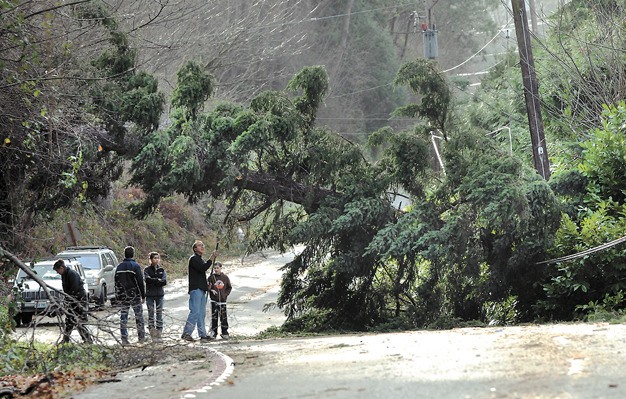What does a brawling windstorm, a football game and a shy high school student have in common?
On Columbus Day, Oct. 12, 1962, a storm with winds up to 100 mph wreaked havoc on the Puget Sound region in what the National Weather Service later designated as Washington’s worst weather disaster of the 20th century. More than 50 people were killed between Vancouver, B.C., and San Francisco, nine in Washington.
As the huge storm hit the Seattle area, the Mercer Island football team was suited up at Islander Stadium, ready to take the field to meet archrival Bellevue for the Homecoming game. At the same time, the dangerous storm that began as Typhoon Freda in the South Pacific Ocean was bearing down on Seattle and the Eastside.
Hours earlier, the storm had moved onto land in California where high winds halted the sixth game of the World Series at Candlestick Park. Power lines and giant redwood trees were reported to have been toppled from the force of the winds.
According to weather service reports, winds at over 100 mph then moved into Oregon. The storm struck Portland, tearing off roofs, toppling trees and destroying buildings with “the fury of nearly a Category 3 hurricane.”
As it blew north, wind gusts were measured up to 92 miles per hour in Vancouver, Wash., and over 100 miles per hour out on the Washington coast. In Longview, the city’s civic center collapsed.
A HistoryLink.org essay describes what followed: the center of the storm hit Seattle at around 7 p.m. The power went out at Sea-Tac Airport. On Highway 99, billboards lay broken and trees lay in the road. Ferry runs were cancelled.
At the Seattle World’s Fair, fair officials closed the Coliseum at 7:30 p.m., worried that the glass windows might blow out.
Communities east of Lake Washington, including Mercer Island, were soon plunged into darkness. In Issaquah, the roof was torn off of the grandstand at the city’s Memorial Stadium.
 At Islander Stadium, the game had begun. But just two plays after kickoff, the game was stopped. It was too dangerous to continue. Halftime festivities with the presentation of Homecoming royalty and the crowning of the queen, Miss Alyce Toda, were postponed.
At Islander Stadium, the game had begun. But just two plays after kickoff, the game was stopped. It was too dangerous to continue. Halftime festivities with the presentation of Homecoming royalty and the crowning of the queen, Miss Alyce Toda, were postponed.
Yet Toda, now Alyce Arai, said that she was not sorry that halftime had been cancelled. Reached by telephone last week at her home in Seattle, she said she was relieved. She had been dreading the moment.
“I felt I was getting an honor I didn’t deserve,” she said. “I felt awful.”
“I am Japanese,” she explained. “My sister and I were the only Japanese or non-white people in Island schools.”
When she and her family found a home on the Island a few years earlier, the realtor said he could not sell them the house until he had asked neighbors if it was alright with them.
Both of Arai’s parents had been in Japanese internment camps during World War II. Even as late as 1962, Japanese were still shunned.
“I was very shy and always felt odd,” she said. “When I was a freshman, I only looked at the floor.”
But she was not left out. A check of the Mercer Island High School Class of 1963 yearbook confirms that she was involved in many activities, including French Club, Spanish Club, Student Cabinet, Pep Club and Service Club, the yearbook staff and more. She even had a nickname, “Acey.”
“The kids were extremely nice and accepted me,” she said. “They elected me to other things that I did not earn, like the drill team.”
Of the abbreviated Homecoming game, she recalled the flowers she held and the wind. “Oh, that wind blew,” she remembered.
The Homecoming dance was held on Saturday night, where the Homecoming royalty and their queen were finally crowned.
The game against Bellevue had been finished that afternoon. To add insult to injury, Bellevue won the game, 7 to 6.
As for Queen Alyce, she put her shyness behind her, perhaps inspired by her old classmates.
“The kids at the school showed a lot of heart and compassion,” she said. “I will always remember that.”


